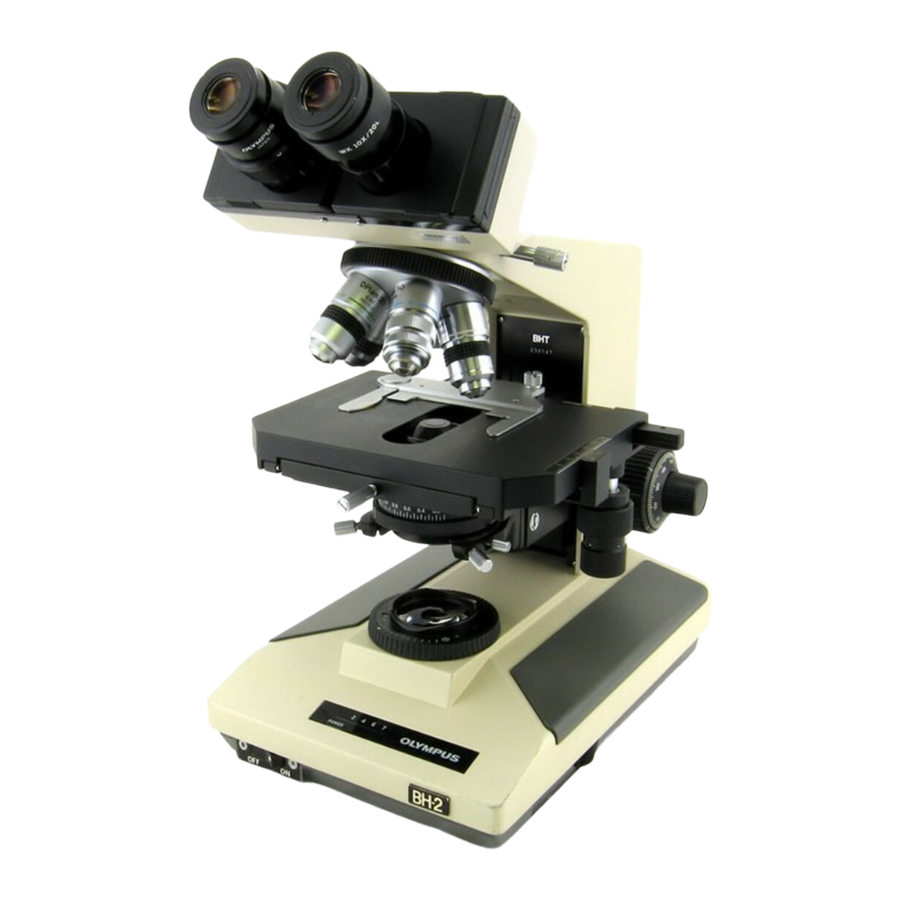Olympus BH2 Series Teardown, Cleaning And Reassembly - Page 43
Browse online or download pdf Teardown, Cleaning And Reassembly for Microscope Olympus BH2 Series. Olympus BH2 Series 45 pages. Phase contrast
Also for Olympus BH2 Series: Troubleshooting & Adjustment Manual (46 pages), Complete Teardown, Cleaning, And Reassembly (23 pages), Complete Teardown, Cleaning, And Reassembly (40 pages), Manual (6 pages), Installation Manual (9 pages)

If this is the case, it means that the field diaphragm was
not at its maximally open position when the knurled
field-adjustment ring was reinstalled. If this happens,
remove the filter holder and knurled ring, and then
reinstall them to obtain a different mesh point of the
geared portion of the knurled ring with the field
diaphragm assembly, such that the full range of motion
can be obtained (see
Figure 188
take a few attempts to find the correct mesh point.
Once the full adjustment range of the field diaphragm
has been verified, use a suitable JIS screwdriver to
reinstall the three m2x7 screws to secure the filter
holder in place (see
Figure
Figure 190 – Secure filter holder in recess of knurled ring
The Light Exit Assembly is now reassembled and ready
to be put back into service.
Figure 191 – Light Exit Assembly ready for service
Collimating the Integral Substage Lighting
If during the course of servicing the stand, the Light Exit
Assembly and/or the pillar arm have been separated
from the base casting, it is recommended that you
perform a collimation of the substage lighting system,
per the
Collimating the Substage Lighting of the
Olympus
BHS/BHSU/BHT/BHTU
document in this series, before using the microscope.
Teardown, Cleaning, and Reassembly of the Miscellaneous Parts of the Olympus BH-2 Microscope Frames
and
Figure
189). It may
190).
Microscopes
Although this collimation is not strictly required
should be done if you wish to obtain the best optical
performance that your microscope is capable of
providing.
A Few Words About Dust Protection
The bases of the BHS/BHSU and the BHT/BHTU stands
are reasonably well sealed against dust intrusion during
normal operation when the lamphouses are installed.
There are, however, a few things to be aware of for
long-term storage of these stands. On the BHT/BHTU
stands, the barrel of the Light Inlet Assembly seals the
light-inlet port on the back of the base, whether or not
the 20W lamphouse is installed, so long-term storage of
BHT/BHTU scopes should not be a problem.
The rear opening of the BHS/BHSU scopes is a different
story, however. The light-inlet port on these scopes is
only sealed when the 100W lamphouse is attached to
the stand, since the light-inlet optics are integral to the
lamphouse and are not present in the stand.
Accordingly, if the BHS/BHSU stand is stored without
the lamphouse attached, the light-inlet port on the back
of the base will be wide open, allowing dust to foul the
primary surface mirror. Olympus provided a plastic dust
cap (see
Figure 192
and
port when the lamphouse is not installed, and this
should be used to keep dust out of the base whenever
the stand is stored without the lamphouse attached.
Figure 192 – Dust cap for BHS/BHSU light port (top view)
1
A great many of the BH-2 scopes in use today have been disassembled for
service at one time or another and have not been re-collimated upon
completion of the repair.
Figure
193) to seal the light
Revision 1
Page 43 of 45
1
, it
